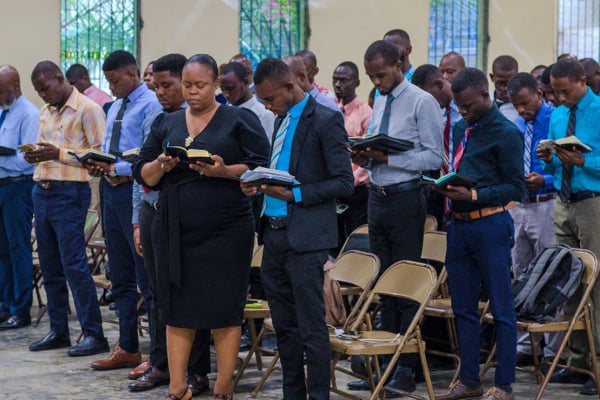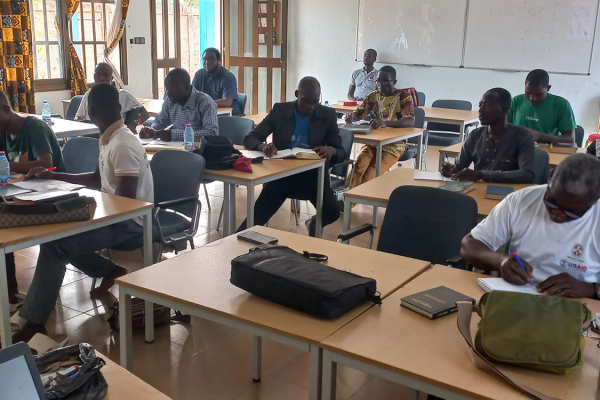
What does Genesis 1 have to do with the Great Commission?
In my experience talking with genuine Christ-followers, the most common understanding of the Great Commission statements in the Gospels and Acts is to tell others about Jesus. Even when speaking about the workplace being a sacred venue for ministry, the most prevalent take-away from those conversations is, “I need to do a better job in my workplace of telling others about Jesus.”
Of course, there is nothing wrong with that understanding; we do want to tell others about Jesus, and do a good job of it!
But that understanding is incomplete and betrays a lack of connection with the “original Great Commission” in Genesis 1:26-28, which goes far beyond telling other people about God.
From the first pages of the Bible, we see that, unlike everything else God created, we are made in God’s image. That means in some finite and imperfect measure, humanity reflects the love, justice, and beauty of God.
As soon as we’re told that we’re made in God’s likeness, God then commands us to “be fruitful and multiply and fill the earth…” (Genesis 1:28). Few people connect these verses to what they understand of “missions,” yet Jesus later reiterates this same command in Mark 16:15 when he says, “Go into all the world.”
What was God’s intention when he created humanity? An enormous question! And essential to understand if we want to know “who are we” and “why are we here” — not only on this planet but also in our daily jobs.
We can answer this question when we put these two realities together of being made like God and commanded to fill the earth, and set them in the world of Genesis 1–2: total well-being (shalom), perfect relationships with God and one another, working in the life-giving garden.
We are image-bearers of God:
- Made to flourish with our Creator and one another.
- Made to work as God does, to provide, create order, bring beauty, and release potential.
- Made to reflect God’s presence, identity, and authority in all the world.
Thousands of years later, this is still our greatest dignity and purpose. The command to “fill the earth” was not for a select few. It was given to all humanity embodied in Adam and Eve. God’s intention was to glorify himself through humanity flourishing to the ends of the earth.
We know too well that sin sabotaged that plan of God. But imagine for a moment if Genesis 3 had not happened and Genesis 1–2 were fulfilled. We would have a whole world that reflects God’s love, justice, and beauty through a diverse yet unified, working, flourishing humanity — a world of shalom.
God has not rescinded his Genesis 1 command. In fact, Jesus renewed it in his command to “go and make disciples of all nations.” The Great Commission, just like the Genesis 1 command, applies to all humanity in relationship to him, in all kinds of work.
The original command in Genesis is often called the Cultural Mandate because culture is what happens when people live and work together.
Wherever we go, we create and influence culture through our words, actions, and attitudes. We speak of ethnic, age, religious, business, work, family, church cultures — each of which is characterized by beliefs, social forms, and material traits.
To the extent that you lead others, whether in your family, job, church, or society, you are a primary architect of culture. You help establish the culture of the specific group for which you are responsible — whether you are aware of it or not.
Carmine Gallo, author of The Storyteller’s Secret, says, “Whether we plan it or not, culture will happen. Why not create the culture we want?”
What does it look like for you — in the workplace, groups, and communities to which you belong — to intentionally reflect God’s love and justice so that people around you can taste God’s shalom and flourish?
Here are five questions* to help you be intentional in the cultures you inhabit:
- What is good that you can promote, celebrate, and protect?
- What is missing that you can contribute?
- What is evil that you can resist or stop?
- What is broken that you can restore?
- Who can you bless and invest in?
We are certainly sent out to tell others about Jesus as we have opportunity. But just as much or more, we have the opportunity to fulfill God’s purpose for us by intentionally creating and influencing culture toward his shalom.
* Questions 1-4 are from John Stonestreet, president of the Colson Center for Christian Worldview and author of A Practical Guide to Culture. John Spadafora is Director of Church Engagement at Crossworld. His passion is to cast vision for and equip churches to pursue the Great Commission both locally and globally.
John Spadafora is Director of Church Engagement at Crossworld. His passion is to cast vision for and equip churches to pursue the Great Commission both locally and globally.
.png)








